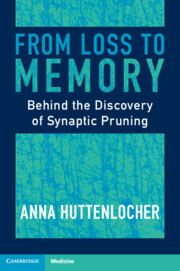Book contents
- From Loss to Memory
- From Loss to Memory
- Copyright page
- Dedication
- Contents
- Preface
- Acknowledgments
- 1 Counting Synapses
- 2 Discovering Synaptic Pruning
- 3 Else, Peter’s Mother
- 4 Richard, Peter’s Father, and Peter’s Uncle Fritz
- 5 Greiz: Kriegskinder (Children of War)
- 6 In Braubach, after the War
- 7 Arrival in America
- 8 Harvard Medical School
- 9 Understanding Sleep and Consciousness: Research at the National Institutes of Health
- 10 Entering the Cognitive Revolution: Neuroscience and Cognitive Psychology
- 11 Physician First, Scientist Second?
- 12 Comparative Brain Regions and Synapse Formation
- 13 Stimulating Progress on Developmental Brain Disorders
- 14 Neurodevelopmental Disorders and Schizophrenia: A Role for Synaptic Pruning?
- 15 Early Childhood Education
- 16 Peter and Janellen’s Collaboration
- 17 Microglial Cells and the Mechanisms of Synaptic Pruning
- 18 Looking Forward: Being a Physician and a Scientist
- 19 Parkinson’s Disease and Berlin
- 20 Auf Deutsch: Back to German
- 21 Memories and Reflections at the End: A Return Trip to Greiz
- Glossary
- Index
- References
13 - Stimulating Progress on Developmental Brain Disorders
Published online by Cambridge University Press: 10 October 2023
- From Loss to Memory
- From Loss to Memory
- Copyright page
- Dedication
- Contents
- Preface
- Acknowledgments
- 1 Counting Synapses
- 2 Discovering Synaptic Pruning
- 3 Else, Peter’s Mother
- 4 Richard, Peter’s Father, and Peter’s Uncle Fritz
- 5 Greiz: Kriegskinder (Children of War)
- 6 In Braubach, after the War
- 7 Arrival in America
- 8 Harvard Medical School
- 9 Understanding Sleep and Consciousness: Research at the National Institutes of Health
- 10 Entering the Cognitive Revolution: Neuroscience and Cognitive Psychology
- 11 Physician First, Scientist Second?
- 12 Comparative Brain Regions and Synapse Formation
- 13 Stimulating Progress on Developmental Brain Disorders
- 14 Neurodevelopmental Disorders and Schizophrenia: A Role for Synaptic Pruning?
- 15 Early Childhood Education
- 16 Peter and Janellen’s Collaboration
- 17 Microglial Cells and the Mechanisms of Synaptic Pruning
- 18 Looking Forward: Being a Physician and a Scientist
- 19 Parkinson’s Disease and Berlin
- 20 Auf Deutsch: Back to German
- 21 Memories and Reflections at the End: A Return Trip to Greiz
- Glossary
- Index
- References
Summary
Sometimes in science you experience an “aha” moment. It can happen while sitting in a talk, reading a paper, doing an experiment or doing the evening dishes. And when you have this jump in understanding it is hard to contain the thrill and excitement. Of course, you might be wrong – the next morning may reveal all the holes. But scientists cherish these infrequent moments when they make a new scientific connection that could change the way they – and subsequently others – think about a problem. This is precisely what happened in May 1993 when the young group leader Chris Walsh heard Peter Huttenlocher present at a neurology meeting focused on epilepsy in Venice, Italy.
Information
- Type
- Chapter
- Information
- From Loss to MemoryBehind the Discovery of Synaptic Pruning, pp. 88 - 91Publisher: Cambridge University PressPrint publication year: 2023
